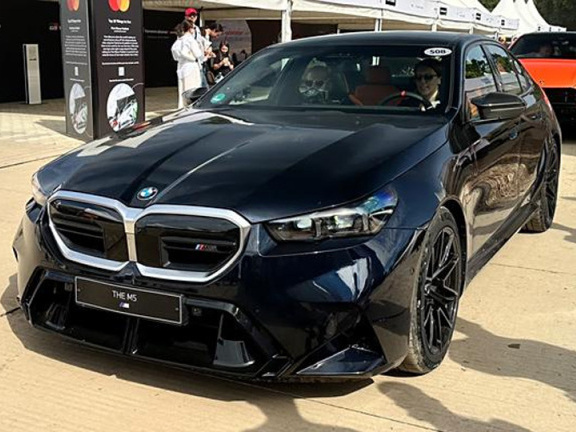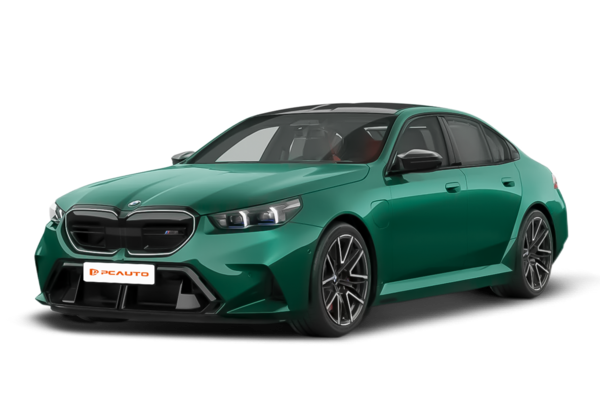Q
How much horsepower does the new BMW M5 2025 have?
The all-new 2025 BMW M5 is expected to feature a high-performance hybrid powertrain, with a combined output projected to hit around 718 horsepower – a significant jump from the previous generation's pure V8 setup. Torque is also set to over 1,000 Nm, and when paired with the xDrive all-wheel-drive system and 8-speed M Steptronic transmission, the 0-100km/h sprint could dip below 3 seconds. Notably, this marks the first time the M5 lineup has adopted plug-in hybrid technology, boasting an 18.6kWh battery pack that should deliver approximately 80 kilometers of all-electric range, blending high performance with everyday practicality. For performance car enthusiasts, the hybrid system doesn't dull the driving thrill; instead, the instant torque from the electric motor sharpens acceleration response. Meanwhile, the active M differential and specially tuned suspension still promise razor-sharp handling in corners. Deliveries of this model are slated to begin in the fourth quarter of this year, so interested buyers should keep an eye on their local dealerships for updates. More detailed performance test data will be released later.
Special Disclaimer: This content is published by users and does not represent the views or position of PCauto.
Related Q&A
Q
How much is insurance for a BMW M5 2025?
The insurance cost for the 2025 BMW M5 varies depending on individual circumstances and insurance company policies, typically ranging from RM15,000 to RM30,000 per year. The specific amount depends on factors such as the vehicle's purchase price, engine displacement, the owner's age, driving record, and the type of insurance selected. High-performance cars like the M5 have higher insurance premiums mainly because their repair costs are expensive and they have powerful engines, leading insurance companies to assess higher risks. Comprehensive Insurance is the most common choice, covering theft, accidents, and third-party liability, while Third-Party Insurance is cheaper but has limited coverage. It is advisable for car owners to compare quotes from several companies before purchasing insurance and consider increasing the No-Claims Discount (NCD) to reduce premiums. Additionally, installing tracking devices or taking defensive driving courses may also help lower insurance costs. Insurance costs for high-performance cars are generally high, so budget planning should be done before buying the car to ensure long-term vehicle maintenance costs are affordable.
Q
How fast is the M5 2025?
The 2025 BMW M5 is a high-performance sedan that really delivers on power. It's packing a plug-in hybrid setup with a 4.4-liter V8 twin-turbo engine and an electric motor, churning out a combined output of over 718 horsepower. It'll hit 0-100 km/h in around 3.3 seconds, and while the top speed is electronically limited to 250 km/h,ticking the M Driver's Package bumps that up to 305 km/h. But it's not just about straight-line speed—this thing handles like a dream too. With the M xDrive all-wheel-drive system, active differential, and adaptive suspension, it stays rock-solid even when you're pushing it hard. For folks who love high-performance cars, the M5's hybrid system is a win-win: it boosts power while also offering some fuel efficiency, especially in the city where electric-only mode cuts down on emissions. Inside, it's loaded with tech, featuring the latest iDrive system and advanced driver assistance features, perfect for owners who want a mix of speed and cutting-edge tech. And if you're craving even more extreme performance, keep an eye out for the upcoming M5 CS version, which is expected to get lighter and even more powerful.
Q
Is the 2025 M5 electric or gas?
The 2025 BMW M5 will feature a plug-in hybrid system, combining a 4.4-liter V8 twin-turbo engine with an electric motor, delivering a combined output expected to exceed 700 horsepower. It retains the driving excitement of traditional high-performance gasoline cars while incorporating the environmental benefits of new energy technology. This powertrain configuration is becoming an increasing trend in the high-performance car segment, with models like the Porsche Panamera Turbo S E-Hybrid also adopting hybrid setups. For car owners who value performance but also want to try new energy, it's a solid choice. Currently, many brands are applying hybrid technology to their high-performance models, which not only boosts power performance but also reduces emissions. These models typically support short-distance all-electric commuting, making daily use more economical, while retaining the convenience of gasoline-powered long-distance driving. The future high-performance car market will likely see more innovations in similar powertrains.
Q
What size engine is in the 2025 M5?
The 2025 BMW M5 is expected to feature a plug-in hybrid system combining a 4.4-liter V8 twin-turbo engine with an electric motor, boasting a combined output likely exceeding 700 horsepower and torque potentially breaking 800 Nm. This powertrain not only carries forward the M5's legacy of high performance but also improves fuel efficiency through electrification. Notably, this marks the first time the M5 has adopted a hybrid system, signaling the shift toward new energy in high-performance sedans—a trend mirrored in competitors like the Mercedes-AMG E63. For drivers who love behind-the-wheel thrills, the hybrid setup delivers more immediate torque response, while the electric motor should make low-speed acceleration feel sharper. These high-performance hybrid systems typically come with sophisticated all-wheel drive and adjustable suspension, ready to tackle everything from daily commutes to track days. If you're eyeing this class of performance cars, it's worth test-driving to feel the difference between hybrid and traditional gas-powered models—after all, the power delivery smoothness and exhaust note character will vary.
Q
How is the 2025 M5 different from the last M5?
The 2025 M5 gets some serious upgrades over the previous generation, especially in the powertrain and electrification departments. The biggest change? It's the first time we're seeing a plug-in hybrid setup under the hood. Pairing that 4.4-liter twin-turbo V8 with an electric motor, the total output is expected to hit 718 horsepower – that's around 100 horses more than the old gas-only model. And with an electric-only range of 60-80 kilometers, it's actually pretty practical for daily short commutes now.
On the chassis front, adaptive suspension and four-wheel steering come standard, making it even more nimble. Yeah, the battery pack adds about 200 kilos to the curb weight, but they've tried to offset that with lightweight bits like the carbon fiber roof. Inside, there's a new curved dual-screen setup and iDrive 8.5, plus a dedicated interface for the hybrid modes.
Outside, the bigger kidney grille and sharper laser headlights are dead giveaways, and the rear diffuser's been redesigned to smooth out the aerodynamics. What really matters here is that this marks the M5's first step into electrification in its 37-year history. Sure, it's heavier, but the torque vectoring and smarter all-wheel-drive system actually make it better on the track. Balancing performance with eco-friendliness like this feels like the way forward for high-performance cars, and we're already seeing similar tech pop up in new models from some competitors.
Q
What is the price of BMW M5 in 2025?
As of 2025, the local price of the BMW M5 is expected to be around RM900,000 to RM1.2 million, depending on the model configuration, optional packages, and market policies at the time. As a high-performance luxury sedan, the M5 is powered by a 4.4-liter V8 twin-turbo engine combined with hybrid technology, delivering a combined output of over 600 horsepower. It also features M xDrive technology with switchable all-wheel drive, balancing track performance with daily driving needs. Notably, this generation of the M5 may further optimize the battery pack and energy recovery system to improve fuel efficiency while retaining the classic rear-wheel-drive handling characteristics. If considering a purchase, it is advisable to keep an eye on official promotional offers, such as low-interest loans or extended warranty services, which can significantly reduce the cost of ownership. Competitors in the same class, such as the Mercedes-AMG E63 S or Audi RS7, are also worth comparing, as they each have unique features in power tuning and technological configurations, and test-driving them can provide a more intuitive feel for the differences. Additionally, insurance rates for high-performance cars are relatively high, so consulting with insurance companies in advance can help avoid budget overruns.
Q
What engine is in the 2022 M5?
The 2022 M5 is powered by a 4.4-liter V8 twin-turbo engine, a high-performance power unit that cranks out up to 600 horsepower and 750 Nm of peak torque. Mated to an 8-speed M Steptronic automatic transmission and equipped with the M xDrive all-wheel-drive system, it can sprint from 0-100 km/h in just 3.4 seconds. This engine features BMW M Division's exclusive track-derived tech, including a cross-cylinder head exhaust manifold design, twin-scroll turbochargers, and a high-precision direct injection system, balancing brutal power with fuel efficiency. Notably, the S63B44T4 engine is a classic from the BMW M Power lineup, with its unique "Hot-V" layout placing the turbos between the cylinder banks to significantly reduce turbo lag. For owners who love modifying, this engine has serious potential—many professional tuning shops can bump up the horsepower to over 700 with ECU remaps and hardware upgrades. For daily driving, it's recommended to use 98-octane gasoline to ensure optimal performance, and regular maintenance of the turbo and cooling systems is crucial for keeping the engine running strong.
Q
How much is the 2022 BMW M5?
The 2022 BMW M5 has a local new car price tag of around RM900,000 to RM1,100,000, depending on configuration options like the Competition package, carbon fiber trim, or custom interior. This high-performance sedan is powered by a 4.4-liter V8 twin-turbo engine churning out 600 horsepower, mated to an 8-speed M Steptronic transmission and an adjustable M xDrive all-wheel-drive system, rocketing from 0-100km/h in just 3.4 seconds. It's worth noting that when buying a high-performance car like this, you've also got to factor in insurance costs that are roughly 30% higher than regular models, plus the official recommended maintenance schedule of every 10,000 kilometers or 12 months—where replacing high-performance brake pads and tires will significantly bump up the costs. If you're looking at the used car market, a 1-year-old M5 with under 20,000 kilometers usually falls in the RM750,000 to RM850,000 range, but you need to pay special attention to how modification records might affect the warranty. Rivals in the same segment, such as the Mercedes-AMG E63 S and Audi RS7 Sportback, have similar price ranges, but the M5 is more highly regarded for its track performance thanks to its precise chassis tuning and all-wheel-drive system.
Q
How much horsepower does the 2022 M5 CS have?
The 2022 BMW M5 CS is powered by a 4.4-liter V8 twin-turbo engine, churning out 635 horsepower and 750 Nm of peak torque. That's a 10-horsepower bump over the standard M5 Competition, making it the most powerful M5 ever. It sprints from 0-100 km/h in just 3.0 seconds and tops out at an electronically limited 305 km/h. But it's not all about raw power – this beast sheds weight with extensive carbon fiber use, like the carbon fiber roof, hood, and rear spoiler, which really sharpens up the handling. For enthusiasts who crave a high-performance sedan, the M5 CS nails that perfect mix of luxury and track-ready DNA. Its chassis setup and all-wheel-drive system are specially tuned too, so it handles daily drives just as well as track days. If you're into this kind of high-performance metal, keep an eye on rivals like the Mercedes-AMG E63 S or Audi RS7 – they’re packing serious punch and driving thrills too.
Q
What engine is in a 2022 M5?
The 2022 M5 is powered by a 4.4-liter V8 twin-turbo engine, codenamed S63B44T4, which features M TwinPower Turbo technology. It cranks out 600 horsepower and 750 Nm of peak torque, paired with an 8-speed M Steptronic automatic transmission and M xDrive all-wheel-drive system. This setup rockets the M5 from 0-100 km/h in just 3.4 seconds, delivering some seriously strong performance. Beyond brute force, this engine serves up linear power delivery and sharp responsiveness. It also boasts improved durability thanks to lightweight construction and an efficient cooling system, making it adaptable to all kinds of driving situations. Another standout feature is the V8's distinctive exhaust note – with adjustable exhaust valves, it strikes a balance between everyday comfort and raw, sporty passion. For performance sedan enthusiasts, big-displacement turbo engines like this are becoming increasingly rare in the age of electrification. And credit to BMW's tuning expertise, it manages to balance fuel efficiency with emissions standards, holding its own even in stop-and-go city traffic or during highway cruises.
Latest Q&A
Q
How much is insurance for a BMW M5 2025?
The insurance cost for the 2025 BMW M5 varies depending on individual circumstances and insurance company policies, typically ranging from RM15,000 to RM30,000 per year. The specific amount depends on factors such as the vehicle's purchase price, engine displacement, the owner's age, driving record, and the type of insurance selected. High-performance cars like the M5 have higher insurance premiums mainly because their repair costs are expensive and they have powerful engines, leading insurance companies to assess higher risks. Comprehensive Insurance is the most common choice, covering theft, accidents, and third-party liability, while Third-Party Insurance is cheaper but has limited coverage. It is advisable for car owners to compare quotes from several companies before purchasing insurance and consider increasing the No-Claims Discount (NCD) to reduce premiums. Additionally, installing tracking devices or taking defensive driving courses may also help lower insurance costs. Insurance costs for high-performance cars are generally high, so budget planning should be done before buying the car to ensure long-term vehicle maintenance costs are affordable.
Q
How fast is the M5 2025?
The 2025 BMW M5 is a high-performance sedan that really delivers on power. It's packing a plug-in hybrid setup with a 4.4-liter V8 twin-turbo engine and an electric motor, churning out a combined output of over 718 horsepower. It'll hit 0-100 km/h in around 3.3 seconds, and while the top speed is electronically limited to 250 km/h,ticking the M Driver's Package bumps that up to 305 km/h. But it's not just about straight-line speed—this thing handles like a dream too. With the M xDrive all-wheel-drive system, active differential, and adaptive suspension, it stays rock-solid even when you're pushing it hard. For folks who love high-performance cars, the M5's hybrid system is a win-win: it boosts power while also offering some fuel efficiency, especially in the city where electric-only mode cuts down on emissions. Inside, it's loaded with tech, featuring the latest iDrive system and advanced driver assistance features, perfect for owners who want a mix of speed and cutting-edge tech. And if you're craving even more extreme performance, keep an eye out for the upcoming M5 CS version, which is expected to get lighter and even more powerful.
Q
Is the 2025 M5 electric or gas?
The 2025 BMW M5 will feature a plug-in hybrid system, combining a 4.4-liter V8 twin-turbo engine with an electric motor, delivering a combined output expected to exceed 700 horsepower. It retains the driving excitement of traditional high-performance gasoline cars while incorporating the environmental benefits of new energy technology. This powertrain configuration is becoming an increasing trend in the high-performance car segment, with models like the Porsche Panamera Turbo S E-Hybrid also adopting hybrid setups. For car owners who value performance but also want to try new energy, it's a solid choice. Currently, many brands are applying hybrid technology to their high-performance models, which not only boosts power performance but also reduces emissions. These models typically support short-distance all-electric commuting, making daily use more economical, while retaining the convenience of gasoline-powered long-distance driving. The future high-performance car market will likely see more innovations in similar powertrains.
Q
What size engine is in the 2025 M5?
The 2025 BMW M5 is expected to feature a plug-in hybrid system combining a 4.4-liter V8 twin-turbo engine with an electric motor, boasting a combined output likely exceeding 700 horsepower and torque potentially breaking 800 Nm. This powertrain not only carries forward the M5's legacy of high performance but also improves fuel efficiency through electrification. Notably, this marks the first time the M5 has adopted a hybrid system, signaling the shift toward new energy in high-performance sedans—a trend mirrored in competitors like the Mercedes-AMG E63. For drivers who love behind-the-wheel thrills, the hybrid setup delivers more immediate torque response, while the electric motor should make low-speed acceleration feel sharper. These high-performance hybrid systems typically come with sophisticated all-wheel drive and adjustable suspension, ready to tackle everything from daily commutes to track days. If you're eyeing this class of performance cars, it's worth test-driving to feel the difference between hybrid and traditional gas-powered models—after all, the power delivery smoothness and exhaust note character will vary.
Q
How is the 2025 M5 different from the last M5?
The 2025 M5 gets some serious upgrades over the previous generation, especially in the powertrain and electrification departments. The biggest change? It's the first time we're seeing a plug-in hybrid setup under the hood. Pairing that 4.4-liter twin-turbo V8 with an electric motor, the total output is expected to hit 718 horsepower – that's around 100 horses more than the old gas-only model. And with an electric-only range of 60-80 kilometers, it's actually pretty practical for daily short commutes now.
On the chassis front, adaptive suspension and four-wheel steering come standard, making it even more nimble. Yeah, the battery pack adds about 200 kilos to the curb weight, but they've tried to offset that with lightweight bits like the carbon fiber roof. Inside, there's a new curved dual-screen setup and iDrive 8.5, plus a dedicated interface for the hybrid modes.
Outside, the bigger kidney grille and sharper laser headlights are dead giveaways, and the rear diffuser's been redesigned to smooth out the aerodynamics. What really matters here is that this marks the M5's first step into electrification in its 37-year history. Sure, it's heavier, but the torque vectoring and smarter all-wheel-drive system actually make it better on the track. Balancing performance with eco-friendliness like this feels like the way forward for high-performance cars, and we're already seeing similar tech pop up in new models from some competitors.
View MoreRelated News

Meet the New BMW M5 G90: Rear-Wheel Steering & RM1.18M Price Tag
AshleyJun 16, 2025

2024 Goodwood Festival of Speed: The All-New Generation BMW M5 Makes Its Debut!
AshleyJul 12, 2024

Neue Klasse platform's first mass-produced vehicle, the all-new BMW iX3 makes its debut, looks just like a concept car
LienSep 8, 2025

BMW X5 will become BMW's first model equipped with a hydrogen fuel cell, with a range of 504 kilometers
JamesSep 8, 2025

BMW's all-new iX3 to be unveiled on September 5, built on the Neue Klasse platform
Kevin WongSep 1, 2025
View More












Pros
Cons